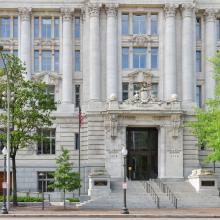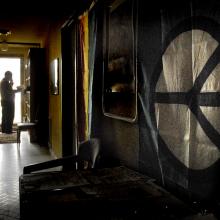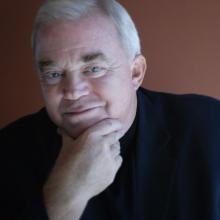Montana
In the year 2050, when today’s 3-year-olds will be 30-year-olds, climate scientists expect the height of the slowly unfolding climate disaster to have arrived. The specifics vary slightly, but most experts warn that some regions will face extreme drought while others are entirely flooded with sea level rise. Dangerous heat and humidity — as some regions of the U.S. have faced this summer — combined with poor air quality will make it dangerous to be outside for a growing portion of the year in many places.
The Northern Cheyenne Tribe, located in southern Montana, said the administration lifted the moratorium without hearing the tribe's concerns about the impact the coal-leasing program has on the tribe, its members, and lands.

Image via Orhan Cam/Shutterstock.com
The City Council in the nation’s capital has overwhelmingly voted for a bill that would allow terminally ill people a medically assisted death.
That makes Washington, D.C., the sixth jurisdiction nationwide to approve what opponents often call “physician-assisted suicide.” The bill would legalize it for those who have six months or less to live, who do not suffer from depression, and who request the option several times.
The Supreme Court’s decision to sit out the legal battle over same-sex marriage will — for now, at least — leave the future of laws prohibiting gays and lesbians from marrying in the hands of lower state and federal court judges. But it also almost certainly means the couples challenging those laws are more likely to win in the end.
The court said Oct. 6 that it would not hear appeals from five states whose same-sex marriage bans had been invalidated by lower federal courts. The decision, issued without explanation, will likely lead to recognition of gay marriages in 11 more states. It also allows an avalanche of legal challenges to the remaining bans to keep going forward in state and federal courts, where gay and lesbian couples have overwhelmingly prevailed.
The court’s decision leaves unchanged 20 state laws blocking same-sex unions. Each is already under legal attack, facing challenges in state or federal court, and sometimes both. Challenges to marriage bans already have reached a handful of state appeals courts and the federal appeals courts for the 5th, 6th, 9th and 11th circuits.
Some of those judges had been waiting to see what the Supreme Court would do. The court’s instruction Oct 6. was: Proceed.
Today, in a long and complicated ruling, the U.S. Supreme Court upheld the Affordable Care Act. This is an important victory for millions of uninsured people in our country and ultimately a triumph of the common good. Children, young adults, and families will have access to basic health care, adding security and stability to their lives.
While I believe the decision is reason to celebrate, it doesn’t mean that this legislation is somehow the flawless will of God; it is an important step in expanding health care coverage and reducing long term costs, but it still is not perfect and more work is yet to be done.
Many Christian organizations and people of faith were involved in advocating for expanded insurance coverage, specifically for low-income and vulnerable people. And that’s what we can never forget: our involvement in the world of politics is always based in and motivated by the way that it affects the lives of real people, and especially poor people.
This last week, I’ve watched the endless political pre-coverage of the Supreme Court decision, and I was struck first by the poor quality of the questions being asked. Now that the decision has been made, the pontification is just as bad. We need to be focused on those who are left out and left behind, not who is up or down in politics and the polls.

Rabbi Allen Secher at his synagogue in Whitefish, Montana. Image via www.thenakedrabbi.com.
Editor's Note: At the beginning of February, the United Nation celebrates World Interfaith Harmony Week. To mark the occasion the Tony Blair Faith Foundation asked people to share their stories of finding friendship and connection with someone of a different faith tradition. This is my story.
When it came time to read from the Torah — handwritten scrolls containing the first five books of the Hebrew Scriptures that are kept in a special ark in every synagogue — something happened I’d never seen or experienced before. The Torah scrolls, which are kept in a blue velvet cover with gold embroidery, were taken down and passed to the congregation. I’d seen men in synagogue hold the scrolls, but I’d never seen them passed this way, from person to person, like the collection basket or the little trays of wine or bread in some of the churches I’d attended over the years.
I’m not Jewish, and in that little gathering of a dozen or so people, I think everyone there knew it. Still, when the scrolls got to me, the woman next to me, without a moment’s hesitation, placed them gently in my arms, like a newborn baby.
I’ve yet to conjure up the words to describe how that moment of inclusion felt. Sacred, yes. Grace-filled, absolutely. But also ancient — tying me to a whole history of a people whom I’d never before thought of as “mine.”
But they are. The Sechers are. The other people at the Bozeman synagogue were. The strangers at the supermarket where we bought matzo and wine were. The people who are reading these words are.



